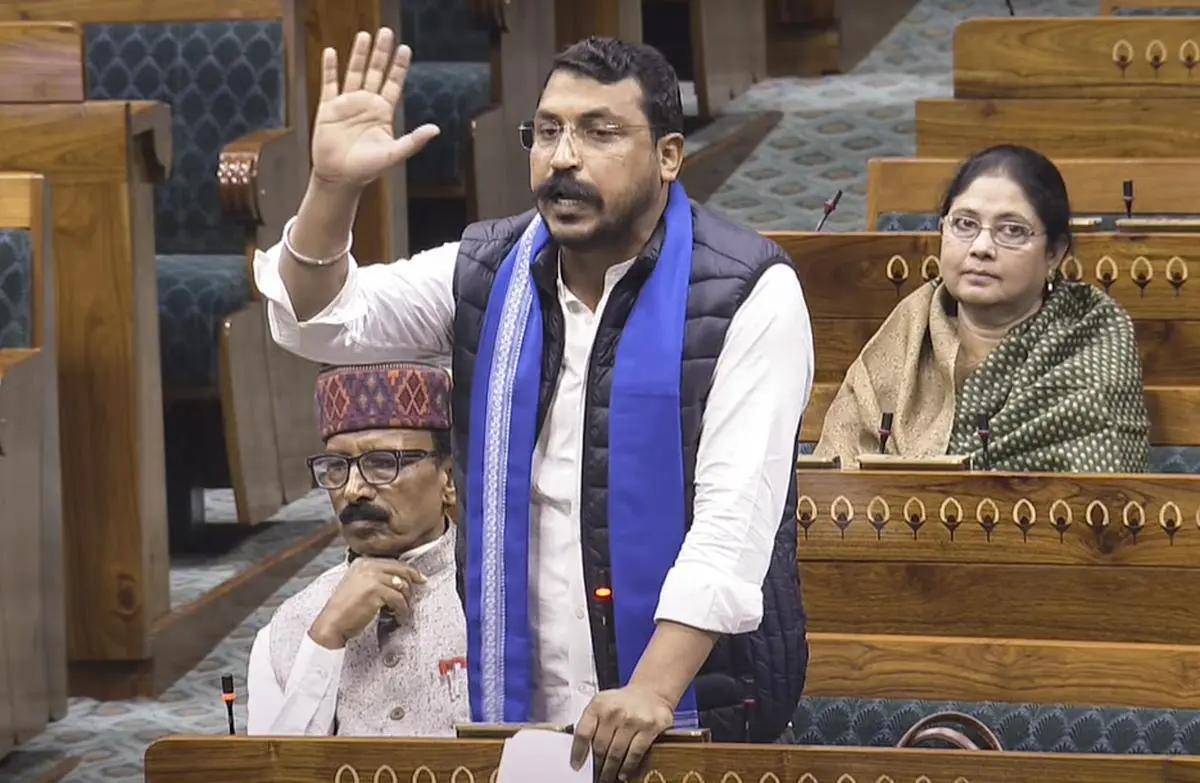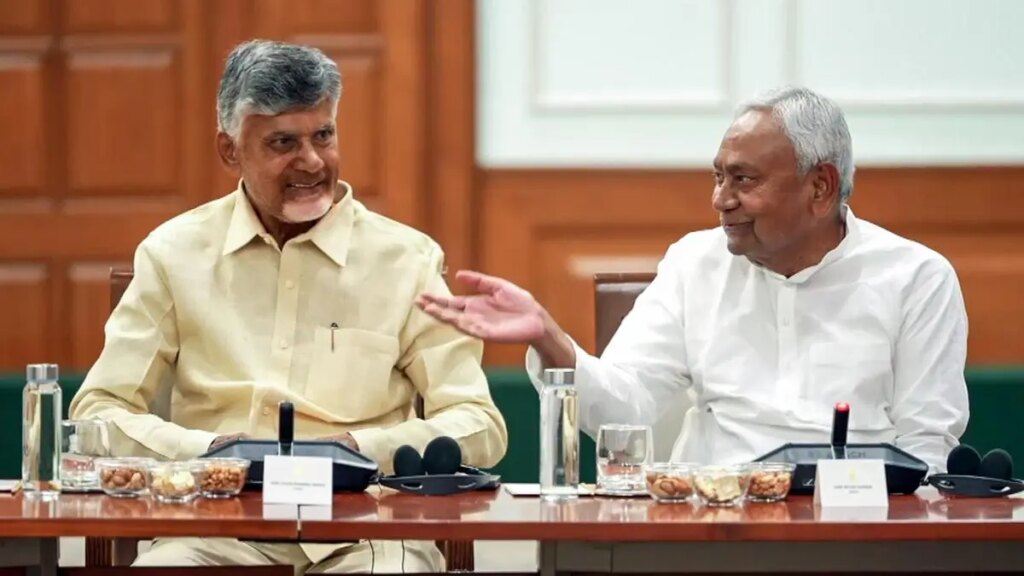Facing mounting criticism from minority communities over the controversial Waqf (Amendment) Bill being pushed by the Centre, the National Democratic Alliance’s (NDA) partners in Bihar and Andhra Pradesh now find themselves entangled in yet another controversy—this time over the Uttar Pradesh administration’s order prohibiting namaz on roads and rooftops. The pressure is palpable.
In Bihar, the Muslim organisation Imarat-e-Shariah recently boycotted the iftar hosted by Janata Dal (United), or JD(U), leader and Chief Minister Nitish Kumar. Similarly, in Andhra Pradesh, the All India Muslim Personal Law Board called for a boycott of iftar parties organised by the Telugu Desam Party (TDP)-led State government under N. Chandrababu Naidu.
The controversy over namaz dominated headlines in the BJP-ruled Uttar Pradesh this week, despite some contrasting visuals: Hindus showering petals on worshippers in Jaipur, Rajasthan (another BJP-ruled State), and the peaceful offering of Eid-ul-Fitr namaz at the Taj Mahal in Agra, where devotees praised the arrangements.
In districts such as Aligarh, Baghpat, Meerut, and Sambhal, local administrations issued directives prohibiting Alvida namaz (the last Friday prayer of Ramzan) on roads and rooftops. The move prompted widespread concern on social media, with many questioning where such restrictions would end.
Also Read | Waqf Bill: Opposition prepares for Supreme Court battle
In Meerut, the police warned that violators of the directive could face severe consequences, including the cancellation of passports and licences. Meanwhile, in Sambhal, authorities initially objected to Muslims offering namaz on rooftops, though they later clarified that the restriction applied only to dilapidated houses in Archaeological Survey of India-protected areas.
This crackdown on namaz followed a series of religious flashpoints. During Ram Navami, disturbing visuals emerged of hooligans projecting “Aum” symbols onto mosque walls using laser lights. During Holi, viral images showed mosques covered with protective sheets to shield them from mischief.
Social media erupted into a war of words, with polarised opinions dominating discussions. The key question remains: where does this all lead? Many fear heightened political and religious polarisation in Uttar Pradesh, with the Assembly election still over two years away.
A double standard?
A viral interview featured a Muslim cleric questioning the rationale behind the restrictions, pointing out that Hindu festival pandals for Durga Puja and Ganesh Chaturthi also occupy public roads, as do kanwariyas during their processions.
The political analyst Rasheed Kidwai told Frontline that the JD(U) and the TDP are uneasy with Uttar Pradesh Chief Minister Yogi Adityanath’s aggressive governance style. “These regional parties, which have historically practised tolerance and coexistence, find themselves uncomfortable with directives banning open-air namaz and the threat of punitive actions like passport cancellations,” he said.
Kidwai suggested that while the JD(U) and the TDP may prefer to push back, they lack the political leverage to confront the BJP directly. Instead, they resort to media statements to express their dissent. With the Bihar election approaching, the JD(U) faces the challenge of maintaining its secular image while balancing its alliance with the BJP. “Perhaps it is time for these NDA allies to form an informal bloc and act collectively—but who will take the first step?” he asked.

Union Minister and Lok Janshakti Party (Ram Vilas) chief Chirag Paswan during the Budget session of Parliament, in New Delhi on March 27, 2025. Chirag’s remarks on the controversy over namaz restrictions and religious practices reflect his late father Ram Vilas Paswan’s legacy of advocating Muslim representation.
| Photo Credit:
Kamal Singh/PTI
While the JD(U) and the TDP tread cautiously, smaller NDA allies have taken bolder stances. Chirag Paswan, leader of the Lok Janshakti Party (Ram Vilas) in Bihar, dismissed the controversy over namaz restrictions and religious practices. “This is unnecessary. India has a long history of religious harmony, where people of different faiths have coexisted peacefully,” he said on March 30.
Paswan criticised attempts to stoke religious divisions for political gain. “Instead of debating where someone offers namaz or whether shops remain open during Navratri, we should focus on real issues. Political parties should not interfere in religious practices—these are matters of personal faith. The day religious organisations stop patronising politicians, and political parties stop meddling in religious affairs, 90 per cent of these problems will disappear.”
His remarks reflect his late father Ram Vilas Paswan’s legacy of advocating Muslim representation, including his push for a Muslim Chief Minister in Bihar in 2005. By distancing himself from the BJP’s hard line stance, Chirag Paswan aims to retain the social coalition built by his father.
Meanwhile, Rashtriya Lok Dal (RLD) leader Jayant Chaudhary reacted sharply to a report in the RSS mouthpiece Organiser about the Meerut police’s warning against roadside namaz. He likened the situation to Nineteen Eighty-Four, George Orwell’s dystopian novel, which depicts an authoritarian regime where surveillance and repression dominate daily life.
Within the RLD, concerns are growing that Yogi Adityanath’s policies could alienate the party’s traditional voter base of Hindu and Muslim farmers, which was built by his grandfather, former Prime Minister Chaudhary Charan Singh. Previously, Jayant Chaudhary had also opposed the Uttar Pradesh government’s orders requiring eateries to display their owners’ names during the kanwar yatra, a move critics saw as an attempt to identify Hindu and Muslim shopkeepers.
JD(U)’s careful balancing act
The JD(U) has taken a cautious approach. After a delegation of Muslim representatives met Nitish Kumar regarding the Waqf Bill, party spokesperson Rajiv Ranjan Prasad stated that Kumar had instructed party members to raise their concerns before the Joint Parliamentary Committee (JPC) examining the Bill. JD(U) MP Dileshwar Kamait subsequently presented these concerns in the JPC.

Aazad Samaj Party (Kanshi Ram) MP Chandrashekhar Azad speaks in the Lok Sabha during the Budget session of Parliament, in New Delhi on March 12, 2025. The Nagina MP has been vocal in his criticism of the Uttar Pradesh government’s crackdown on Eid namaz.
| Photo Credit:
Sansad TV via PTI
Prasad spoke about Kumar’s commitment to minority rights, citing his decision to reopen cases related to the 1989 Bhagalpur communal riots after coming to power. Separately, JD(U) MLC Ghulam Ghaus told a news channel that, in his “personal opinion”, the Modi government should withdraw the Waqf Bill—just as it had repealed the farm laws after protests.
Despite these reassurances, JD(U) leaders are worried about a potential consolidation of Muslim votes in favour of the Opposition Rashtriya Janata Dal-Congress alliance. There is also concern that the BJP’s hardline policies, such as the namaz restrictions and the Waqf Bill, could tarnish Nitish Kumar’s secular image and erode the JD(U)’s long-term support among minorities.
Azad and rising dissent
Aazad Samaj Party (Kanshi Ram) leader Chandrashekhar Azad, the young Lok Sabha MP from Nagina, did not hold back in his criticism of the Uttar Pradesh government’s crackdown on Eid namaz.
“There seems to be a competition among Uttar Pradesh police officers—who can make the most hateful statement against Muslims to get media attention? The police are not courts; they have no right to cancel passports or licences. If someone commits a crime, they should be punished through legal means, but why is it that only Muslims are targeted?” Azad said in a television interview.
He sarcastically referenced the government’s “Saugat-e-Modi” welfare kit, questioning whether such restrictions were also part of the package. “At this rate, soon Muslims will need permission to breathe. Who knows? Tomorrow, there may even be a law banning Muslims from breathing,” he added.
Also Read | Do Muslims need to change their approach?
Meanwhile, Muslim organisations in Andhra Pradesh, already frustrated with the TDP’s conditional support for the Waqf Bill, have intensified their demands. They are urging the party to pressure the Modi government to withdraw the Bill, which is set for discussion in Parliament on April 2.
All India Majlis-e-Ittehad-ul-Muslimeen chief Asaduddin Owaisi has sought to corner the NDA partners, warning that Muslims will not forgive Chandrababu Naidu, Nitish Kumar, Chirag Paswan, or Jayant Chaudhary for their stance on the Waqf Bill.
As the Waqf (Amendment) Bill is set to be moved in the Lok Sabha on April 2, political fireworks are expected. The coming days will test the ability of NDA constitutents to balance their regional political interests while negotiating the BJP’s hard line agenda.
Source:https://frontline.thehindu.com/politics/waqf-amendment-bill-controversy-nda-muslim-backlash-nitish-kumar-chandrababu-naidu/article69400551.ece

